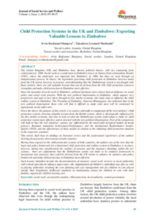ABSTRACT
The United Kingdom (UK) and Zimbabwe have shared political history, with ties emanating from colonization in 1890. Social work as a profession in Zimbabwe traces its history from colonisation, Kaseke (1991), where the profession was imported into Zimbabwe in 1964, but later on went through an indigenisation process. In theory, the legislation governing child protection in Zimbabwe borrows much from the UK system, however in practice, notwithstanding that the Zimbabwean system is not fraught with flaws entirely, there are still valuable lessons that can be derived from the UK child protection system to strengthen and make child protection in Zimbabwe more effective.
Since the inception of social work in Zimbabwe, political ideologies have always had an influence on social policy and social work practice. With the new political dispensation in Zimbabwe, which appears very progressive and open to new ideas through its free market economy, this study aims to influence the child welfare system in Zimbabwe. The President of Zimbabwe, Emerson Mnangagwa, has indicated that in the new political dispensation those who will find it difficult to make ends meet will be cushioned by appropriate social safety nets.
Given the above, the purpose of this article is to explore and make a comparison of the two countries’ child protection systems, drawing valuable lessons from the British system, which is ideologically influenced by the free market economy, and also to look at what the Zimbabwean system could adopt to make its child protection system more effective, and to dovetail with the new political dispensation. Part of the comparison will look at how the two countries’ systems are influenced by the universally accepted models of social policyi:e Residual, Industrial Achievement-Performance and the Institutional Redistributive models. Spicker (2018), and the effectiveness of these models in relation to the obtaining child protection situation in the respective countries.
This article shall base its findings on literature review and the professional experiences of the authors deriving from practice observations in both countries.
Having been exposed to the child protection systems of both countries, the authors are of the view that the legal and policy framework for a functional child protection and welfare system in Zimbabwe is in place, however, taking into consideration the realities of practice and the dynamics obtaining within the two systems, there are adjustments that the Zimbabwean system can make to its statutory framework to incorporate best practices that could be derived from the UK system to enhance its statutory and policy framework and make child protection in Zimbabwe more effective.
Such lessons identified include the decentralization of statutory social work services to local authorities with central government taking a supervisory role, digitalization of children’s individual case files as well as placing authorities retaining the care planning and case management role for children in care placed outside their boundaries, deliberate emphasis on maintaining contact for children in care with their families, support for children leaving care.

